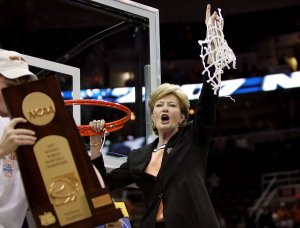Pat Summitt, who built the University of Tennessee’s Lady Volunteers into a perennial power on the way to becoming the winningest coach in the history of major college basketball, has died.

Summitt passed away Tuesday after battling early onset dementia, “Alzheimer’s type,” according to a statement from the Pat Summitt foundation.
She was 64.
“Since 2011, my mother has battled her toughest opponent, early onset dementia, ‘Alzheimer’s Type,’ and she did so with bravely fierce determination just as she did with every opponent she ever faced,” her son Tyler Summitt said. “Even though it’s incredibly difficult to come to terms that she is no longer with us, we can all find peace in knowing she no longer carries the heavy burden of this disease.”
In her 38 years at Tennessee, Summitt won eight national titles and 1,098 games — the most by any Division 1 basketball coach, male or female. Her teams made an unprecedented 31 consecutive appearances in the NCAA Tournament.
But beyond the wins and the statistics, Summitt also was a paradigm shifter who had a profound impact on women’s college athletics.
When she became head coach of the Lady Vols in 1974 at the age of 22 — barely older than some of her players — the NCAA did not even formally recognize women’s basketball. Summitt had to drive the team van to road games herself.
As the wins and the championships piled up, Summitt’s astonishing achievements commanded national attention and helped usher women’s basketball into the modern spotlight.
“She’ll be remembered as the all-time winningest D-1 basketball coach in NCAA history, but she was more than a coach to so many — she was a hero and a mentor, especially to me, her family, her friends, her Tennessee Lady Volunteer staff and the 161 Lady Vol student-athletes she coached during her 38-year tenure,” Tyler Summitt said.
A leader through victories and tough times
Summitt’s impressive coaching record earned her a spot in the Basketball Hall of Fame in 2000. But in 2011, her illustrious career was plunged into uncertainty when she announced she was diagnosed with early onset Alzheimer’s.
Faced with the devastating news, Summitt remained characteristically herself. She vowed to keep coaching.
“This is not a pity party,” she said. “We’re not going to sit here and feel sorry for Pat Summitt.”
She coached for one more year, securing the Lady Vols their 16th SEC Championship under her leadership. Then she retired. But she didn’t step away from the sport she loved.
“If anyone asks, you can find me observing practice or in my office,” Summitt said at the time. “Coaching is the great passion of my life, and the job to me has always been an opportunity to work with our student athletes and help them discover what they want. I will continue to make them my passion.”
More than a coach, more than a celebrity
Though she was notoriously tough on the sidelines, Summitt’s legacy to her players extended far beyond the game.
“We learned about what it takes to be a leader, what it takes to be a great woman, what it takes to be a great lady, what it takes to have character, what it takes to have poise,” said former Lady Vol and WNBA star Tamika Catchings in 2013.
Summitt’s concern for her players extended to the classroom as well. All of the athletes she coached who completed their eligibility went on to graduate from the university.
Summitt’s success made her a legend at the University of Tennessee, even to the school’s other celebrated heroes. In 2012, Tennessee alum and NFL quarterback Peyton Manning presented Summitt with the Arthur Ashe Courage Award at ESPN’s ESPY Awards.
She was “a mentor and a close friend,” Manning said. “Someone I can look up to, and someone I can talk to. And I know I’m just one of many, many people Pat has guided over the years.”
In 2012, President Barack Obama awarded Summitt the Presidential Medal of Freedom, the nation’s highest civilian honor.
“When I think about my two daughters, who are tall and gifted, and knowing that because of folks like Coach Summitt they’re standing up straight and diving after loose balls and feeling confident and strong, then I understand that the impact that these people have had extends beyond me,” Obama said at the ceremony. “It will continue for generations to come.”
Vols Nation in mourning
Summitt remained a pillar of the University of Tennessee community and culture until her death. When news of her illness became public in 2012, “We Back Pat” became a rallying cry for thousands upon thousands of students and supporters who attended games bearing t-shirts and signs with the slogan.
Upon learning recently that her life was nearing its end, these same groups of students and supporters expressed their grief and prayers.
“Praying for Coach [Pat Summitt] and her family tonight!” current Volunteers quarterback Josh Dobbs tweeted.
“Can’t find the words right now,” said head football coach Butch Jones.
“It’s been in Ohio as early as the mid-1850s at least, brought in as an ornamental plant because of its unique foliage and white flowers,” Gardner said. “It was actually planted in people’s landscaping, and it has been spreading.”
The sentiments extended far beyond the Knoxville, Tennessee, campus.
Auburn University basketball head coach Bruce Pearl called Summitt a “dear, trusted friend.”
Notre Dame women’s basketball head coach Muffet McGraw called Summitt “the best role model a woman in coaching could have.”







































